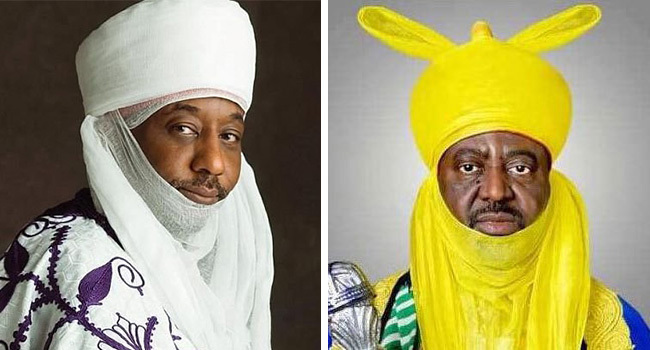The Battle of the Thrones and absurdity of justice. By Abayomi Odunowo
Today, a fierce battle is being waged in Kano, not just between warring factions vying for control of the city and its spoils, but also between those who claim ownership of its history. Jafaar Jafaar’s assertion that Emir Sanusi II should be referred to as the 59th Emir of Kano, not the 16th, has ignited a firestorm of debate and conflict online.
The history of Kano, as Jafaar argues, stretches back centuries before the imposition of Fulani rulers after the Jihad led by Dan Fodio in 1807. His claim that there were at least 42 Hausa rulers who preceded the Fulani ascendancy challenges the traditional narrative of the city’s history. The implications of this assertion are profound, questioning the legitimacy and authority of the current rulers and the symbols of power they wield.
As the people of Kano navigate these turbulent waters, caught between brotherly disputes and colonial legacies, it is a poignant reminder of the wounds of conquest that still run deep. The irony of those whose ancestors snatched Kano now fighting over its control is not lost on those who witness this drama unfold. May peace and reconciliation prevail, and may the voices of all those who have been silenced by history be heard once more.
The history of Kano’s monarchy is rich and well-documented, with ‘The Kano Chronicle’ standing out as one of the most renowned sources of information on the rulers of Kano since the establishment of the Bagauda Dynasty in 998 AD. However, the origins of Kano’s monarchy trace back even further, to a man known as Barbushe, who was said to possess great strength and spirituality. According to the Chronicle, Barbushe’s ancestor, Dalla, was a formidable hunter who could slay elephants with his bare hands and carry them for miles on end.
Barbushe’s prophecies about a stranger coming to conquer Kano were met with skepticism by his people, who dismissed his warnings as evil speakings. Despite their disbelief, Barbushe foresaw the inevitable conquest of their land and the subsequent reign of the conqueror over Kano for generations to come.
This tale of Barbushe and his prophetic powers serves as a testament to the enduring legacy of Kano’s monarchy and the role of seers and visionaries in shaping its history. The Kano Chronicle stands as a testament to the enduring power of oral traditions and historical records in preserving the legacy of Kano’s rulers through the centuries.
The Kano Chronicle, as penned by H.R. Palmer in 1908, articulates a solemn prophecy that left the people of Kano in a state of despair and disbelief. The foretelling of a future marked by slavery and calamity struck fear in the hearts of the populace, prompting them to seek guidance on how to avert such a fate. Their leader, bearing the burden of delivering unwelcome truths, offered a stark response: resignation. And so, with heavy hearts and resigned spirits, they accepted their predetermined destiny and have since remained in a state of passive acceptance.
This prophecy, intertwined with the historical context of Kano, raises poignant questions about the resilience of a people faced with the weight of their past and the uncertainties of their future. The echoes of subjugation and misrule, as foretold in the prophecy, reverberate through the centuries, leaving a lingering sense of fatalism and resignation in their wake. The Hausa people, grappling with a distorted narrative of their ancestry and identity, find themselves at a crossroads between reclaiming their lost heritage and coming to terms with the immutable forces of destiny.
In reflecting on the enduring legacy of the Kano Chronicle and its resonance with contemporary struggles, we are reminded of the enduring power of history to shape collective consciousness and influence the course of human events. The lesson distilled from the depths of resignation is a sobering reminder of the inexorable march of fate and the limitations of human agency in the face of immutable forces.
Throughout the history of Kano, emirs have been seen as symbols of power and authority, yet their positions have often been subject to the whims of political leaders. Successive emirs have found themselves in precarious situations, at times being consumed by the appetite of governors who seek to exert their control over the traditional institution.
One such example is the installment and subsequent dethronement of Muhammad Sanusi as emir by Premier Ahmadu Bello in 1954. Despite opposition from federal forces, Sanusi was removed from the throne in 1963. Similarly, his grandson, Lamido, faced resistance from Abuja when he ascended to the emirship in 2014, only to be dethroned by a former deputy governor six years later.
Emirs, as highlighted by Governor Abubakar Rimi in 1982, are viewed as public figures whose appointments are at the pleasure of the governor. Rimi’s outspoken remarks towards the Emir of Kano at the time, Ado Bayero, exemplified the tenuous nature of the emir’s position, yet Bayero managed to retain his status despite the governor’s attempts to oust him.
In Kano history, emirs have been likened to riverside reeds, swaying in the political currents of the time. The saga of successive emirs and their struggles against the influence of governors highlights the delicate balance of power between traditional institutions and modern governance.
The recent Kano case has raised serious concerns about the current state of the judiciary in Nigeria. The fact that a Federal High Court from Nigeria was able to sit in the United States and make a ruling on a local chieftaincy matter in Kano is alarming, to say the least. This case has highlighted the unchecked power and influence of judges in the country, who seem to operate without any boundaries or limitations.
The situation painted by this case is one where judges can seemingly act with impunity, delivering judgments at lightning speed and without regard for existing laws or jurisdictional boundaries. The very essence of a federation, which allows for autonomy and self-governance at the state and local levels, appears to be under threat.
It is imperative that we use this case as a wake-up call to reaffirm our commitment to the principles of federalism and the rule of law. The state must not be allowed to continue backing judges who act beyond their mandate and trample on the rights of citizens. Accountability and transparency in the judiciary must be upheld, and the independence of the judiciary must be respected.
In conclusion, the Kano case should serve as a stark reminder that the judiciary is a pillar of democracy and must operate within the confines of the law. We must push back against any attempts to undermine the principles of federalism and ensure that justice is served appropriately and fairly for all.
Section 251 of our constitution clearly outlines the areas in which the Federal High Court has jurisdiction. However, recent events surrounding the Kano emirship tussle have brought to light the abuse of power and the erosion of order within our judicial system.
The constitution unequivocally states that the Federal High Court has jurisdiction over matters relating to the revenue of the government of the federation, treasonable offenses, and criminal causes within the scope of subsection 1. Nowhere within this section does it empower the court to intervene in chieftaincy matters, yet a judge assumed jurisdiction in the Kano emirship dispute under the cover of darkness, signing injunctions that go against the constitutional provisions.
This misuse of power and manipulation of the judicial system for personal gain is reminiscent of historical events such as the appointment of “midnight judges” in the United States, where positions were filled at the last minute to secure power for political allies. The lack of accountability and respect for the rule of law within our own judicial system is alarming and sets a dangerous precedent for the future.
In William Golding’s ‘Lord of the Flies’, we see how power can corrupt individuals, leading them from order to chaos. The same can be said for our own society, where the allure of power has clouded judgment and eroded the principles of justice and fairness. It is imperative that we hold our judicial system accountable and ensure that justice is served without the influence of darkness and deceit.
The judiciary in Kano, long before the arrival of the white man, was characterized by judges who were known for their learning and piety. Emir Sulyman, who ruled from 1807 to 1819, had a mother who was held accountable for mistreating a private citizen, and despite her status, she was subjected to corporal punishment by the upright alkali Yusuf al-Hausi. Similarly, Emir ‘Abd Allah Maje Karofi, who reigned from 1846 to 1882, was not above the law either. When he failed to pay for a horse he purchased from a Tuareg, the judge, Alkali Ahmad Rufa’i, found him guilty and ordered his confidant to be sold into slavery to settle the debt.
These examples illustrate a time when rulers were held accountable by the law, and justice was served without bias or favoritism. However, in today’s judiciary, the situation is quite different. Judges may now prioritize personal gain over justice, leading to a system where power and influence often dictate the outcome of cases. The noble principles that once governed the judiciary seem to have been overshadowed by corruption and self-interest. It is imperative that we reflect on the legacy of past judges in Kano and strive to uphold the values of integrity and impartiality in our justice system.
In my moments of devotion and meditation, I often find myself drawn to the fierce and primal world of wild animals. Watching them on TV channels, I am mesmerized by the intricate dance of life and death that unfolds before my eyes. And yet, little did I know that I would witness a similar spectacle of power and dominance right here in the human world, in the heart of Kano.
The recent events in Kano, from Thursday to Saturday night, played out like a scene straight out of a National Geographic special. The dethroning of Emir Aminu Ado Bayero and the enthronement of Sanusi Lamido Sanusi was a brutal display of power dynamics and political maneuvering. Just like the vulture, hyena, and lion sizing each other up over a banquet of skunked meat, the power players in Kano were engaged in a vicious struggle for supremacy.
But this is not a new phenomenon in the world of monarchies. Enthronements and dethronements have been a part of royal history for centuries. It is a game of thrones that has been played out time and time again, with kings and emirs rising and falling in a never-ending cycle of power struggles.
So how did Sanusi become the emir in June 2014? Was he the favored candidate of the kingmakers, or did he seize the throne through cunning and manipulation? And what about Bayero, who ascended to the throne four years prior – how did he come to power? These are questions that may never be fully answered, as the murky world of royal politics is shrouded in secrecy and intrigue.
As I reflected on the events in Kano, I couldn’t help but be reminded of the wise words of General Ibrahim Babangida, who famously said that those who come to power through a coup should always be prepared for a coup against them. It is a harsh truth that power is never secure, and that those who hold it must constantly be on guard against those who seek to take it from them.
The Russian writer Yevgeny Zamyatin, in his novel ‘We’, also echoes this sentiment, warning that there can never be a final revolution. The number of revolutions is infinite, and one era will always be succeeded by another. This is the nature of power politics – there is no goodnight, no final resting place for those who seek to hold onto power.
And so, as Sanusi returns to power and Bayero is cast aside, I am reminded that the wheel of fortune is ever turning. The lust for power is insatiable, and there will always be those who seek to snatch it away from others. In the end, power is but an illusion, a fleeting moment in the grand scheme of things.
In my moments of devotion and meditation, I find solace in the wisdom of the wild animals on TV channels. In their brutal simplicity, they remind me of the futility of power and the never-ending cycle of dominance and submission. And as I watch the drama unfold in Kano, I am reminded that in the grand tapestry of life, power is but a fleeting shadow, easily snatched away by those who dare to seize it.





